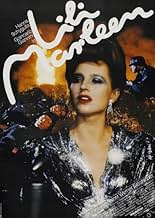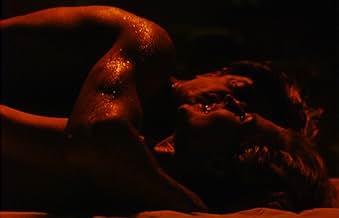CALIFICACIÓN DE IMDb
7.1/10
4.4 k
TU CALIFICACIÓN
Una cantante se convierte en un símbolo del Tercer Reich gracias a una canción.Una cantante se convierte en un símbolo del Tercer Reich gracias a una canción.Una cantante se convierte en un símbolo del Tercer Reich gracias a una canción.
- Premios
- 1 premio ganado y 4 nominaciones en total
Karl-Heinz von Hassel
- Henkel
- (as Karl Heinz von Hassel)
Raúl Gimenez
- Blonsky
- (as Raul Giminez)
Argumento
¿Sabías que…?
- TriviaShot in English for American distribution; later dubbed in German
- ErroresAfter attempting suicide, Willie is seen performing "Lili Marleen" in the Berlin Sportpalast as part of a deal with the Nazis, dazzlingly dressed in front of thousands, and the event is transmitted live. Then suddenly all is held up by the announcement that all German forces have surrendered (VE Day, May 8, 1945). Of course, in the final months of the regime no-one would bother about arranging a sumptuous live transmission of music; by this time, Berlin was a heap of rubble.
- ConexionesFeatured in Century of Cinema: Die Nacht der Regisseure (1995)
- Bandas sonorasLili Marleen
(German Version)
(based on a poem from the 1915 book "Die kleine Hafenorgel" by Hans Leip)
Music By Norbert Schultze,
Vocals Hanna Schygulla
(p) 1981 Schlicht Musikverlag, Phonogram, GmbH, DRG Records, Inc., Philips
© Metropolis Records
Published By Brampton Music Ltd., Chappell Music Ltd., Peter Maurice Music,
EMI Music
Opinión destacada
Many critics have felt offended that R.W. Fassbinder has portrayed both protagonist Wilkie and the Nazis in this movie in a human-like manner. Connoisseurs of other Fassbinder films, however, will realize that "Lili Marleen" (1981) belongs to Fassbinder's "women movies" like "The Marriage of Maria Braun" (1979) and "Lola" (1981). Fassbinder was convinced that "stories can be told much better with women than with men", because, according to Fassbinder, while men usually fulfill their determined roles in society, "women are capable of thinking in a dialectic manner". Dialectics, however, means that there is not only a thesis and its antithesis like usually in our black-and-white world, but a synthesis where the oppositions coincide. Moreover, dialectic means that because of the third instance of synthesis the absolute opposition of the difference between thesis and antithesis is abolished. Concretely speaking: Starting from a dialect point of view and portraying the fascist state, the underground fighters must necessarily use the basic means like the rulers do, and between offenders and victims there is thus a chiastic relation, so that every offender is also victim and every victim is also offender. Fassbinder has illustrated this abstract scheme, that transcends classical logic, in his play "The City, the Garbage and the Death" (1975) which was filmed by Daniel Schmid under the title "Shadow of Angels" (1976).
Therefore, approaching an a priori controversial topic like Nazi Germany, in a dialectic manner, the depiction of this time in the form of a movie gets even more controversial, especially for people who cannot or do not want to see that our recognition of the world is by far not exhausted with a primitive light-switch schema, but needs the third instance of synthesis as controlling instance of its opposite members thesis and antithesis. The mutual relationship between offenders and victims has to scrutinized, since it is simply not true that the offenders are the bad ones and the victims the good ones. In a synthetic viewpoint, the bad ones participate on the goodness as the good ones participate on the badness. They are mutually related. In a world-view based on classical logic, a relation between good and bad cannot even been established, and in an ethics based on this insufficient system of logic, the bad conscience of the survivors of Nazi Germany, feeling (illogically enough) responsible for the deeds of their ancestors, exclude the possibility of a relationship between the two extremes and thus a synthesis in the form a new evaluation based on this relationship as well. From Fassbinder's dialectic viewpoint, it follows that neither Lili Marleen nor Lola nor Maria Braun can be condemned for their "misuse" of the ruling system for their private purposes, because they don't misuse them, they just use them. In the opposite, since victims must repeat the actions of the offenders as the offenders must repeat the actions of the victims, because "good" and "bad" are no longer simple mirror images of one another like in two-valued logic, their strategies are legitimated by the chiastic structure of a logic that describes our world, that is not black and white at all, much better than a black-and-white logic.
Therefore, approaching an a priori controversial topic like Nazi Germany, in a dialectic manner, the depiction of this time in the form of a movie gets even more controversial, especially for people who cannot or do not want to see that our recognition of the world is by far not exhausted with a primitive light-switch schema, but needs the third instance of synthesis as controlling instance of its opposite members thesis and antithesis. The mutual relationship between offenders and victims has to scrutinized, since it is simply not true that the offenders are the bad ones and the victims the good ones. In a synthetic viewpoint, the bad ones participate on the goodness as the good ones participate on the badness. They are mutually related. In a world-view based on classical logic, a relation between good and bad cannot even been established, and in an ethics based on this insufficient system of logic, the bad conscience of the survivors of Nazi Germany, feeling (illogically enough) responsible for the deeds of their ancestors, exclude the possibility of a relationship between the two extremes and thus a synthesis in the form a new evaluation based on this relationship as well. From Fassbinder's dialectic viewpoint, it follows that neither Lili Marleen nor Lola nor Maria Braun can be condemned for their "misuse" of the ruling system for their private purposes, because they don't misuse them, they just use them. In the opposite, since victims must repeat the actions of the offenders as the offenders must repeat the actions of the victims, because "good" and "bad" are no longer simple mirror images of one another like in two-valued logic, their strategies are legitimated by the chiastic structure of a logic that describes our world, that is not black and white at all, much better than a black-and-white logic.
- hasosch
- 22 ene 2008
- Enlace permanente
Selecciones populares
Inicia sesión para calificar y agrega a la lista de videos para obtener recomendaciones personalizadas
- How long is Lili Marleen?Con tecnología de Alexa
Detalles
- Fecha de lanzamiento
- País de origen
- Idiomas
- También se conoce como
- Lili Marleen
- Locaciones de filmación
- Productoras
- Ver más créditos de la compañía en IMDbPro
Taquilla
- Presupuesto
- DEM 10,500,000 (estimado)
- Total en EE. UU. y Canadá
- USD 8,144
- Fin de semana de estreno en EE. UU. y Canadá
- USD 11,623
- 16 feb 2003
- Total a nivel mundial
- USD 8,148
- Tiempo de ejecución2 horas
- Mezcla de sonido
- Relación de aspecto
- 1.66 : 1
Contribuir a esta página
Sugiere una edición o agrega el contenido que falta

Principales brechas de datos
By what name was Lili Marlene (1981) officially released in Canada in English?
Responda

































